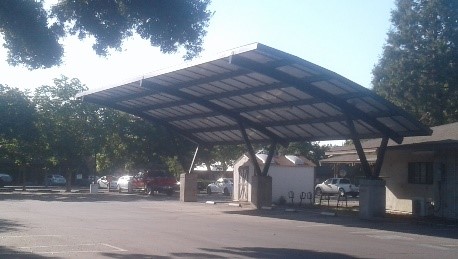Congregational Highlight: St. Martin’s in Davis Achieves Zero Carbon
The following article appeared in a a new series that California IPL (Interfaith Power and Light) uses to highlight congregations that are making a difference and inspiring others to do the same. They wrote, “A decade long commitment, and they’re there! This summer we are excited to share the story of St. Martin’s in Davis, one of the first faith communities we know of to achieve a zero carbon footprint. The leaders of the impressive multi-year effort tell their story below.”
Summer 2020: St. Martin’s
St. Martin’s has always been, like its community of Davis, environmentally sensitive. St. Martin’s believes climate change is an existential threat to God’s creation and is committed to continuing to work toward helping create a more just and sustainable world. 
For many years, St. Martin’s has had a Caring for God’s Creation committee and has made practices like recycling, composting, and not using plastic the norm on our campus. We support bicycling to church by blessing bicycles and providing ample bike racks. We have encouraged parishioners to look at their own habits around transportation, dietary choices, and other lifestyle decisions that can have an impact on climate change. We have held multiple book studies and classes exploring the link between our faith and how we care for the planet.
The road to becoming a “zero-carbon” church has been long and steady. Already by 2013 St. Martin’s had installed a symbolic solar array that produced about 10% of its power. At that point the church decided to significantly expand its on-site solar electricity production, requesting bids from three qualified contractors. The most responsive bidder came back with an offer to install and own a large solar array, through a traditional Power Purchase Agreement (PPA), where St. Martin’s committed to buy the clean electricity produced on its property. The array was sited over part of the parking lot, offering some cars respite from the sun during the summer, as well. This array offered some improvements to the original installation, as well.
We continued slow and steady to achieve zero emissions. Since there is no way to have clean natural gas, we replaced gas appliances with electric heat pumps. By 2018, we reduced the church’s carbon footprint by about 60%, annual natural gas bill by 50%, grid electricity bills by 75%, and overall energy costs by nearly 20%. This successful experience encouraged the church to consider additional steps to achieve complete carbon neutrality.
 At the end of 2019, one of the church’s parishioners, having received and unexpected financial windfall, approached the Vestry and offered to purchase additional 12kW of solar panels that would provide enough electricity to make the church carbon neutral. The parishioner gained the tax credit and future depreciation, to fully gift the panels and ensuing clean electricity to the church when tax-credit requirements allow. This gift was in partnership with the church committing to make use of this clean electricity and replace the remaining gas appliances (three gas furnaces and a gas water heater) with new electric heat pumps. This cost of $30,000 was the same value of the donated panels and installation. We hope our pursuit to become carbon neutral can provide other congregations and communities with an example of what can be done.
At the end of 2019, one of the church’s parishioners, having received and unexpected financial windfall, approached the Vestry and offered to purchase additional 12kW of solar panels that would provide enough electricity to make the church carbon neutral. The parishioner gained the tax credit and future depreciation, to fully gift the panels and ensuing clean electricity to the church when tax-credit requirements allow. This gift was in partnership with the church committing to make use of this clean electricity and replace the remaining gas appliances (three gas furnaces and a gas water heater) with new electric heat pumps. This cost of $30,000 was the same value of the donated panels and installation. We hope our pursuit to become carbon neutral can provide other congregations and communities with an example of what can be done.
Josy Miller and Bob Polkinghorn, Senior Wardens
Beth Robbins, Chair, Care for God’s Creation Committee
Pamela Dolan, Rector
Stan Forbes


